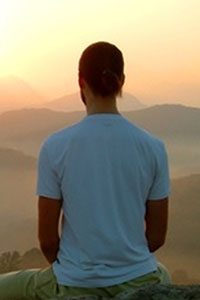Meditation is about your own self-discovery. Learning to meditate is about discovering your own natural ability to shift into a way of being that is natural and effortless. It's about finding what already exists in your own awareness. My goal with my guided meditations is to create a platform from which you can make your own discoveries, so ther e is no right or wrong way to do them. Meditation is a happening, not something that you do. However it happens for you is just right.
Yesterday I answered an email question making this point, and today I received a reply back which was so beautiful. It's all about this very point, in this case as it applies to someone experiencing anxiety. I'm sharing part of the email exchange here because I think it might be meaningful for many of you.
Question:
"I have always had an interest in meditation and have known for some time that it would help me get over my anxiety and panic attacks but only in the last 3 months have I made it a part of my daily life and the results have been dramatic. Just knowing that the peace that meditation brings is available to me whenever I need it has made a huge difference to my day to day life and your podcasts have been instrumental in this. I really can't thank you enough for taking the time out of your life to do this for others.
However, the anxiety I feel often manifests itself physically as a tight chest and shallow breathing. During meditations I have found that focusing on my breathing when it is already laboured sometimes makes this worse as I become more conscious of the unpleasant sensation and this feeds the anxiety. My breathing does eventually become effortless but generally only when I take my mind off my breathing.
I imagine that this may be the case for others who suffer from heightened anxiety and would love to hear your views and opinions on the matter.
Thanks again for making the podcast and the website. It really has been a huge help for me to make meditation part of my daily life."
Answer:
"Thank you so much for your open sharing of your journey with anxiety. It's wonderful ...that you've made meditation part of your life. You are very welcome for the podcast -- it's so inspiring to hear from people with stories like yours!
These meditations are really meant as a springboard for the discovery of your ability to relax and enter a meditative state. Although we do have a Breath Awareness Meditation among the podcasts, and some other meditations refer to breathing, there are many that don't involve awareness of the breath. Perhaps you'll find that certain meditations are more useful than others at different times. For example, when you are particularly anxious, the breath meditation may not be the best one for you. You can trust your intuition on this!
And when you are doing a meditation you don't need to follow the instructions precisely. There's no right or wrong experience or way to do them. They are there for your own exploration and discovery. You discovered that at certain times taking your mind off your breathing works best. You can trust yourself and do just that!"
Questioner's Reply:
"Thank you so much for your reply. The fact that you said that there is no right and wrong experience and that the meditations are there for our own discovery really has helped me see the breathing issue in a different light. Even if my breath isn't effortless then that's ok because this is my experience and whatever happens during my meditation is right for me. I'd get frustrated in the past thinking that because my breathing was difficult then I was doing it wrong somehow. Of course you mention these things in your podcasts but sometimes you have to be told something many times before you take actually take it on board don't you?
As I have realised many times since I started meditating, the relaxation and peace I'm looking for only comes when I stop frantically trying to find it. The first time I ever felt the complete peace that meditation can bring I felt so stupid! I'd been looking everywhere for this feeling during my anxiety and there it was all the time, quietly waiting for me to stop looking. Just that knowledge made all the difference."


